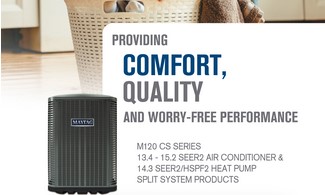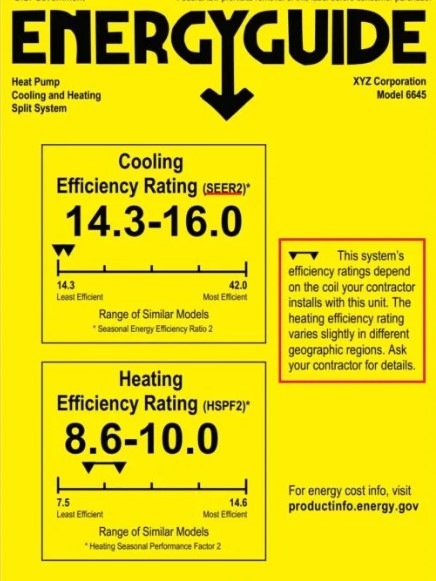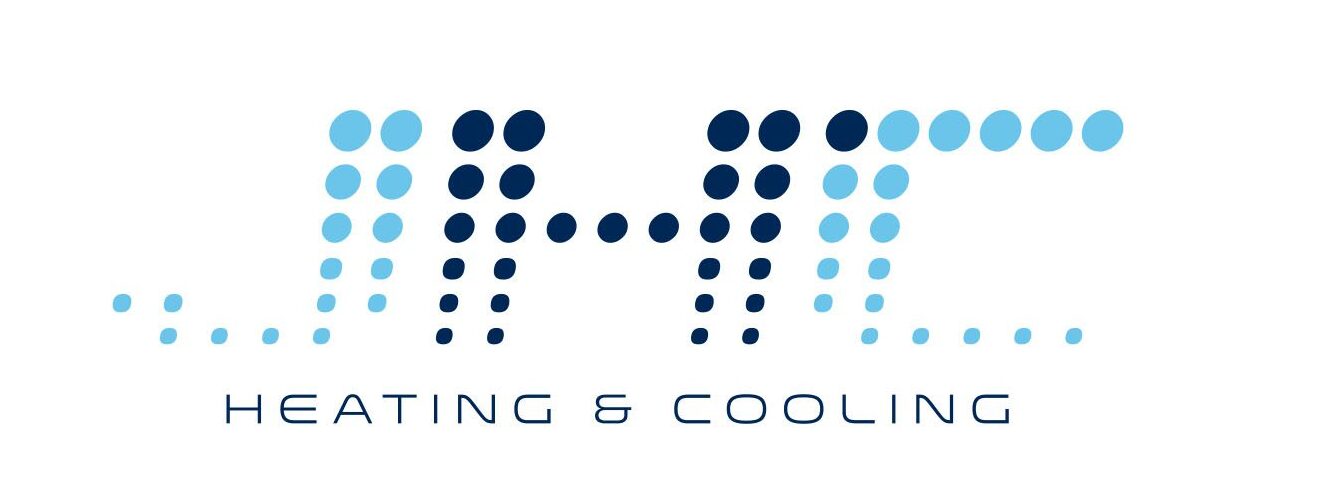As summer temperatures soar, keeping our homes cool becomes a top priority. However, the cost of running an air conditioning (AC) system can quickly add up, making energy efficiency a crucial factor to consider. While the EER rating will tell you the efficiency of an air conditioner at perfect conditions. One of the most important metrics for measuring the performance efficiency of an A/C system during the whole summer season is the SEER rating.
SEER stands for Seasonal Energy Efficiency Ratio. The SEER rating is calculated by dividing the total cooling output (measured in British Thermal Units, or BTUs) by the total electrical energy input (measured in watt-hours) used during the same period.
Consult a Professional-Johns Home Comfort we can assess your home's specific needs and recommend the most efficient system. JHC can also help you to navigate any available incentives and rebates.


MAVIAG
PROVIDING
COMFORT, QUALITY
AND WORRY-FREE PERFORMANCE
M120 CS SERIES
13.4-15.2 SEER2 AIR CONDITIONER &
14.3 SEER2/HSPF2 HEAT PUMP SPLIT SYSTEM PRODUCTS
ENERGY DEFINITIONS SEER2 Seasonal
Energy Efficiency Ratio 2
Measures cooling performance on air conditioners, heat pumps and gas/electric packaged products.
Why is SEER Important?
Cost Savings**: A higher SEER rating indicates a more efficient AC system, which translates to lower energy consumption and reduced utility bills. Investing in a higher SEER-rated unit can save you money in the long run. Efficient A/C systems can reduce energy consumption, which in turn lowers greenhouse gas emissions. By choosing a system with a higher SEER rating, you contribute to environmental conservation and help combat climate change. Higher SEER-rated systems often come with advanced features that enhance comfort, such as better humidity control and quieter operation. These systems can maintain a consistent temperature in your home without frequent cycling on and off.
SEER, it measures the amount of cooling power an air conditioner produces versus how much energy it consumes.
SEER2, which is a recent measurement used in Canada and the U.S. that measures efficiency under a wider range of operating conditions
The new energy efficiency standards were introduced in January 2023. These new standards require a seasonal energy efficiency ratio (SEER) of no less than 14 SEER for residential systems in Canada and the U.S.
When selecting an AC system, it's essential to consider your climate, budget, and cooling needs. Also, A/C systems need regular maintenance to work as efficiently as possible.
Climate--In regions with hot, prolonged summers, a higher SEER rating can provide significant savings. In milder climates, a lower SEER rating may suffice.
Budget--While higher SEER-rated systems are more expensive upfront, the long-term savings on energy bills can offset the initial cost. Evaluate your budget and energy consumption to determine the best option. Larger homes or homes with poor insulation may benefit more from a high SEER-rated system, as they require more cooling power to maintain a comfortable temperature.
The SEER Rating sheet should be listed on all heating and cooling units.

ENERG GUIDE
Cooling Efficiency Rating 14.3-16.0
Heating Efficiency Ratings 8.6-10.0
If you're thinking of upgrading your system, the SEER rating chart may be helpful but keep in mind that prices vary significantly depending on the AC unit type, size, brand and model, SEER rating, and BTUs.
British Thermal Unit is a measure of heat, a form of energy or defined as the amount of heat required to raise the temperature of one pound of liquid water by one degree in Fahrenheit. When used as a specification for an air conditioner, the BTU number given refers to the amount of heat that the unit can remove from the air per hour.
e.g
1-Ton air conditioning system can remove 12,000 BTUs of heat from the air per hour. (a/c tonnage has nothing to do with weight) Choose the right size of the air conditioner for the size of your home.
Room Size:
500 sq ft
1000 sq ft
1500 sq ft
2000 sq ft
Recommended BTUs
15,000 btu
27,000 btu
54,000 btu
65,000 btu
By thoroughly assessing these factors, you can choose an air conditioning system that suits your requirements, enhances comfort, and offers energy-efficient cooling for years. If you have any uncertainties about the installation process, seek guidance from a professional HVAC technician at Johns Home Comfort , tailored for you.
You can improve your home and get expert help for bigger upgrades. Then, take savings further with rebates on Heat pumps including ground source heat pumps, air source heat pumps, cold climate air source heat pumps, and heat pump water heaters.
Up to $3,000


